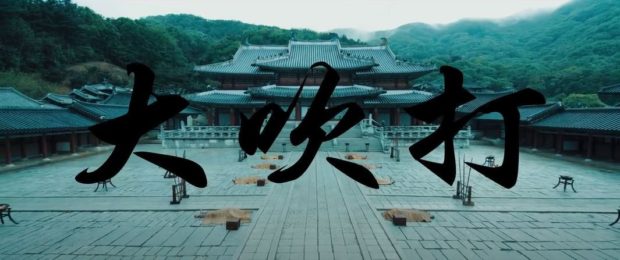SEOUL — The lead track of “D-2,” released in May by Suga of K-pop sensation BTS, has sparked global fans’ interest in traditional Korean music.
The title of the piece, “Daechwita,” refers to a genre of traditional Korean music that was performed at a king’s parade and other military ceremonies. The music consists mainly of wind instruments and percussion instruments.
The new hip-pop track, which was created based on the traditional sound source provided by the National Gugak Center, on Wednesday ranked No. 76 on Billboard’s This Week’s Hot 100 chart, which shows the most popular songs in the US across all genres.
The K-pop boy band’s influence did not stop there.
“BTS is making me learn Korean history and music. This is interesting,” a viewer commented on the National Gugak Center’s YouTube clip about “Daechwita.” The five-minute explanatory clip, which was posted four years ago, had reached over 120,000 views as of Sunday. Another video on the National Gugak Center’s YouTube channel, which features the original full version of the traditional performance of the song, also had more than 140,000 viewers as of Sunday.
English subtitles were added to the two videos last week.
“Look how fast the National Gugak Center is responding to the trend. It is great to see English subtitles,” a viewer commented.
Some fans commented that the explanatory video was helpful in understanding Suga’s song better.
“After watching Suga’s music video as a fan, I wondered what the man is saying at the beginning. I had no idea even though I am Korean. It is great to discover the details this way,” a BTS fan commented on the YouTube channel.
The new song and the traditional music both begin with a man called “Jipsa,” who plays the role of conductor, shouting “Myunggeumilha ‘Daechwita’ harapsinda.” The National Gugak Center’s video explains that it means the “Daechwita” performance is to begin at the sound of the “jing,” which is a traditional Korean percussion instrument that makes low and grand sounds.
This is not the first time BTS has used elements of traditional Korean culture in its music. The boy band’s music video for “Idol” also includes many traditional cultural elements such as “Bukcheong Sajanoreum,” also known as traditional lion dance-drama.
Meanwhile, Suga’s latest mixtape also includes the controversial song “What Do You Think?” The song has been criticized for containing a vocal sample from a 1977 speech given by cult leader Jim Jones, who led the infamous mass murder-suicide of over 900 people in Jonestown, Guyana, in 1979.
On Tuesday, BTS’ agency Big Hit Entertainment released an official apology for using the speech, while denying any speculation about Suga purposely including the voice. The agency also re-released the track after deleting the audio sample in question.
